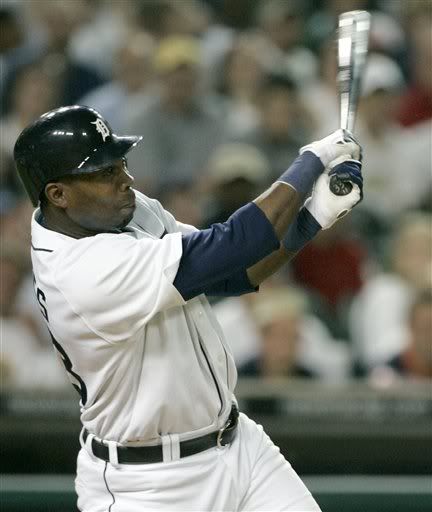Defense At The Expense Of Offense? That's OK, When It Comes To Inge And Everett
No disagreements here. I've seen many a rally linger and fester, all with two outs already in the books. It is, indeed, difficult to get that third out on occasion.
So you can imagine how hard it is to get four outs.
Yet that's what the Tigers' pitchers were forced to do on too many occasions last season -- get four outs in an inning that only requires three.
The culprit, of course, was the overall team defense, which was far too leaky to qualify the Tigers as legitimate playoff contenders. And they weren't; they finished in last place.
The left side of the infield was a top offender. Third base was initially manned by Miguel Cabrera, but he never found a comfort zone. Carlos Guillen gave it a shot, and he wasn't all that much better. It wasn't until Brandon Inge found some adequate playing time at 3B that those problems at third leveled off. At shortstop? Well, let's just say that Edgar Renteria is the Giants' problem now.
The outfielders were OK, but not great. But most of the fourth outs were courtesy of the Tigers infielders. Make no mistake.
This year, Inge is shackled to third base, and that's a good thing. No more catching for Brandon, with Gerald Laird and Matt Treanor around. At shortstop, it's Adam Everett, slick with the glove.
Ah, but here's the rub -- the trade-off, if you will. Will the defense of Inge and Everett -- with their ability to eliminate a lot of fourth outs -- be enough to offset their demonstrated weakness at the plate?
That is the question, indeed.
Me? I'm willing to take my chances with the gloves of Inge and Everett and put more pressure on the other seven hitters in the lineup to produce. Clearly, last year's arrangement didn't work. And it's not like Renteria made up for his lack of range with his bat, anyway.
There will be much talk, as there should be, about the Tigers' pitching -- both the starters and the bullpen. There's no question that if the Tigers don't pitch, they won't win. But let's say the pitchers DO pitch, and those guys who were either hurt or underachieved, or both, bounce back and have decent seasons (see Verlander, Justin and Zumaya, Joel). Then the focus will be right back on the defense -- specifically the infield defense and its success rate at preventing the dreaded fourth out from being necessary.
The Tigers need Brandon Inge and Adam Everett to run a tight ship left of second base. They can make like Eddie Brinkman with the bat, as far as I'm concerned, as long as they channel Steady Eddie with the glove, too.
















 Proud Member of DIBS
Proud Member of DIBS
